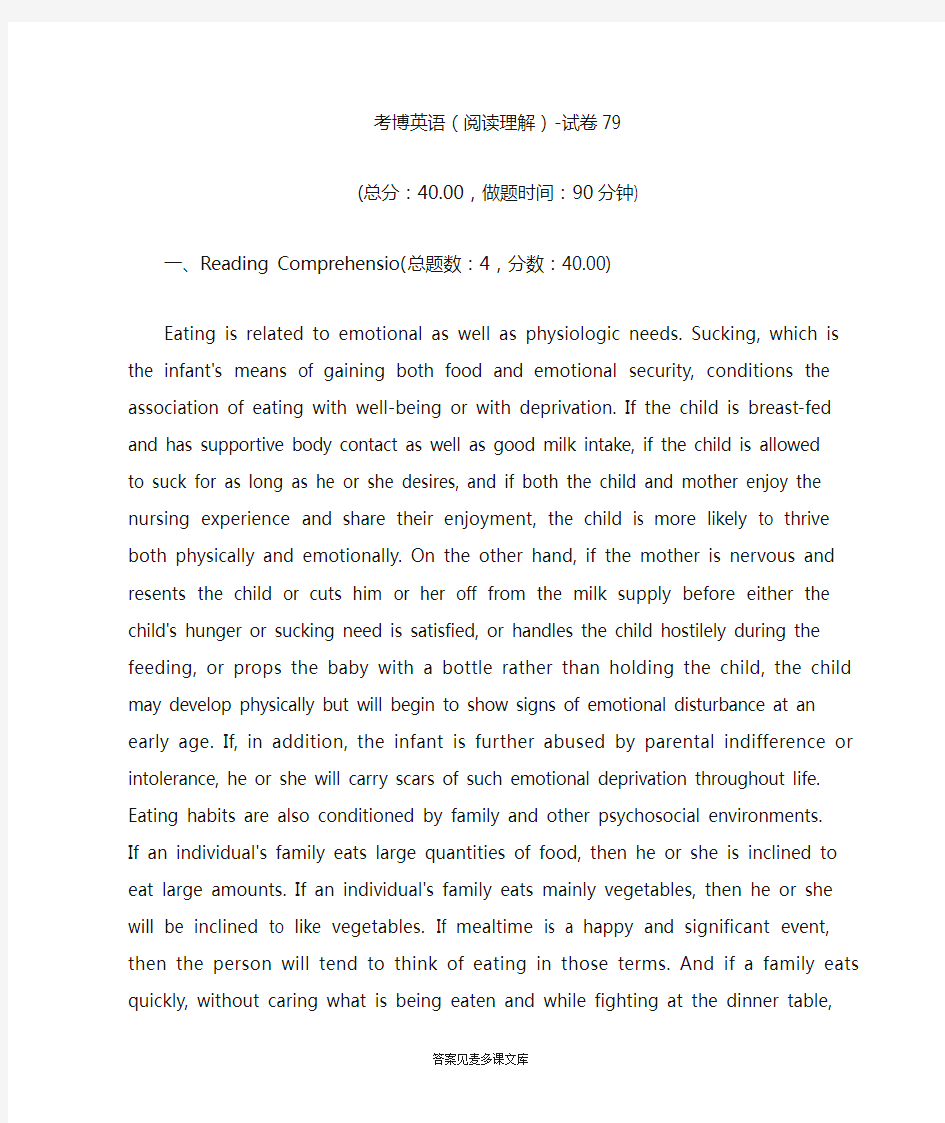考博英语(阅读理解)-试卷79.doc

- 1、下载文档前请自行甄别文档内容的完整性,平台不提供额外的编辑、内容补充、找答案等附加服务。
- 2、"仅部分预览"的文档,不可在线预览部分如存在完整性等问题,可反馈申请退款(可完整预览的文档不适用该条件!)。
- 3、如文档侵犯您的权益,请联系客服反馈,我们会尽快为您处理(人工客服工作时间:9:00-18:30)。
考博英语(阅读理解)-试卷79
(总分:40.00,做题时间:90分钟)
一、Reading Comprehensio(总题数:4,分数:40.00)
Eating is related to emotional as well as physiologic needs. Sucking, which is the infant's means of gaining both food and emotional security, conditions the association of eating with well-being or with deprivation. If the child is breast-fed and has supportive body contact as well as good milk intake, if the child is allowed to suck for as long as he or she desires, and if both the child and mother enjoy the nursing experience and share their enjoyment, the child is more likely to thrive both physically and emotionally. On the other hand, if the mother is nervous and resents the child or cuts him or her off from the milk supply before either the child's hunger or sucking need is satisfied, or handles the child hostilely during the feeding, or props the baby with a bottle rather than holding the child, the child may develop physically but will begin to show signs of emotional disturbance at an early age. If, in addition, the infant is further abused by parental indifference or intolerance, he or she will carry scars of such emotional deprivation throughout life. Eating habits are also conditioned by family and other psychosocial environments. If an individual's family eats large quantities of food, then he or she is inclined to eat large amounts. If an individual's family eats mainly vegetables, then he or she will be inclined to like vegetables. If mealtime is a happy and significant event, then the person will tend to think of eating in those terms. And if a family eats quickly, without caring what is being eaten and while fighting at the dinner table, then the person will most likely adopt the same eating pattern and be adversely affected by it. This conditioning to food can remain unchanged through a lifetime unless the individual is awakened to the fact of conditioning and to the possible need for altering his or her eating patterns in order to improve nutritional intake. Conditioning spills over into and is often reinforced by religious beliefs and other customs so that, for example, a Jew, whose religion forbids the eating of pork, might have guilt feelings if he or she ate pork. An older Roman Catholic might be conditioned to feel guilty if he or she eats meat on Friday, traditionally
a fish day.(分数:10.00)
(1).A well-breast-fed child______.(分数:2.00)
A.tends to associate foods with emotions
B.is physiologically and emotionally satisfied
C.cannot have physiologic and emotional problems
D.is more likely to have his or her needs satisfied in the future
(2).While sucking, the baby is actually______.(分数:2.00)
A.conscious of the impact of breast-feeding
B.interacting with his or her mother
C.creating a nursing environment
D.impossible to be abused
(3).A bottle-fed child______.(分数:2.00)
A.can be healthy physiologically, but not emotionally
B.cannot avoid physiologic abuse throughout life
C.is deprived of emotional needs
D.is rid of physiological needs
(4).From the list of eating habits, we learn that______.(分数:2.00)
A.everyone follows his or her eating pattern to death
B.one's eating pattern varies with his or her personality
C.there is no such things as psychosocial environments
D.everybody is born into a conditioned eating environment
